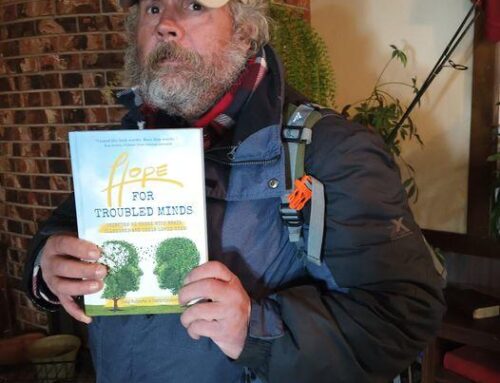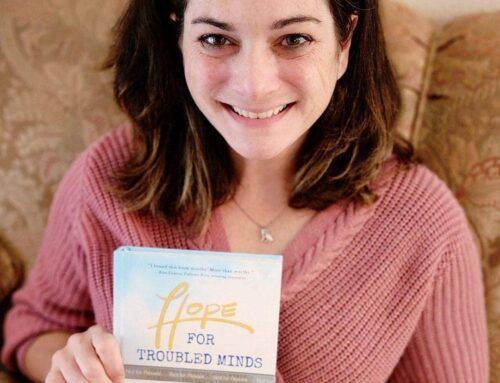When I first received my bipolar diagnosis, the picture painted for me of my future was rather bleak. The staff at the psychiatric hospital explained that I would likely not be able to continue in ministry. I would go on disability, have repeated hospitalizations and the chances of remaining in my marriage were slim to none.
My psychiatrist, however, offered a ray of hope. He recommended a memoir that had just been published by one of the most world-renowned expert on bipolar disorder – Kay Redfield Jamison. In Unquiet Mind: A Memoir of Moods and Madness, Jamison beautifully describes her own life-long struggle and brilliantly depicts the love-hate relationship many folks with Bipolar have with their illness. She defines what she prefers to call “Manic-depression”
…a disease that both kills and gives life. Fire, by its nature, both creates and destroys. “The force that through the green fuse drives the flower,” wrote Dylan Thomas, “Drives my green age, that blasts the root of trees/ Is my destroyer.” Mania is a strange and driving force, a destroyer, a fire in the blood.
In other works, Jamison extensively explores the relationship between bipolar and creativity, citing examples in the lives of many artists past and present who displayed significant symptoms yet produced amazing expressions of life and the world around them.
Recently, I re-read An Unquiet Mind (for the fourth time, I think). One passage I was particularly drawn to —
“No amount of love can cure madness or unblacken one’s dark moods. Love can help, it can make the pain more bearable, but always one is beholden to medication that may or may not always work and may or may not be bearable. Madness, on the other hand, most certainly can, and often does kill love through its mistrustfulness, unrelenting pessimism, discontents, erratic behavior, and especially through its savage moods.”
It’s sad, but often true that people with bipolar seem incapable of sustaining intimate relationships. Redfield’s own marriage relationship ended, joining the ranks of the more than 90% of folks with bipolar who divorce.
So is it worth it? If given the opportunity, should we eradicate bipolar through gene therapy? For now (at least), Redfield would say, “No.” As she poetically reflects on her own experience living with the illness.
‘I honestly believe that as a result of it I have felt more things, more deeply had more experiences. more intensely loved more and been more loved; laughed more often for having cried more often; appreciated more the springs for all the winters; worn death “as close as dungarees,” appreciated it — and life, more; seen the finest and most terrible in people, and slowly learned the values of caring, loyalty, and seeing things through…”<
Not many of us (only one, in fact) can be Kay Redfield Jamison. I see my bipolar more as a “thorn in my flesh” than something that has enhanced my life. Still, I am grateful. Through this thorn I have discovered that God’s grace is sufficient. This realization has led me to a more abundant life in Christ and given me a greater appreciation for the struggles of others.
How about you? Those of you with bipolar, how do you view your illness? If you had the choice, would you seek out a cure? How have you learned to make the most of it?
Discover more from Delight in Disorder
Subscribe to get the latest posts sent to your email.









” It’s sad, but often true that people with bipolar seem incapable of sustaining intimate relationships. Redfield’s own marriage relationship ended, joining the ranks of the more than 90% of folks with bipolar who divorce.” Wow, this so sounds like me, Tony.
I’ve had an inability to sustain marriages, jobs, projects – this really gives me new insight about this illness. And it also gives me a new way to write about an issue that’s been nagging at me for weeks and weeks. I also just ordered Redfield’s book and should receive it within a couple of days. Thanks for reminding me about it, and that final quote which I identify with completely.
You are truly a light in the darkness.
You are in good company, Susan. The statistics on the prevalence of divorce for persons with bipolar are alarming and the stories heart-breaking. I don’t know of any solution, but I can sure identify the problem.
Like you, I found Kay Redfield Jamison’s book, An Unquiet Mind, extremely helpful when I was first struggling with bipolar disorder. In terms of relationships, I have been blessed with a husband who is very compassionate and tolerant of my struggles. He doesn’t suffer from mental illness and provides an example of a healthy mind for me on a daily basis. We’ve been together 23 years. I am so grateful to God for him.
Another book I found very helpful was William Styron’s Darkness Visible. He was married to his wife Rose for many years. He doesn’t write much about that in this book, but she stuck with him through horrific episodes.
I praise God for the steadfast love you share with your husband. It is certainly a gift of God you have gratefully embrace, for which you show gratitude, the best response we can give.
Styron’s book is on my must-read list. The few quotes I’ve read from the book leads me to believe I had better be in a relatively stable frame of mind to go on the journey.
Yes, I would seek out a cure, as it is a life threatening illness that I have passed along to my child. I am one of the few whose marriages has survived (and still thrives) through my disorders ups and downs. I won’t pretend to know the answer to how that is. I will just be forever grateful to God for it.
Passing it on to my children is likewise a fear I have. After being diagnosed, I took measures to ensure we had no more biological children. You are certainly blessed to have such a loyal and faithful husband, something for which you are appropriately grateful for. May God bless your continued journey together.